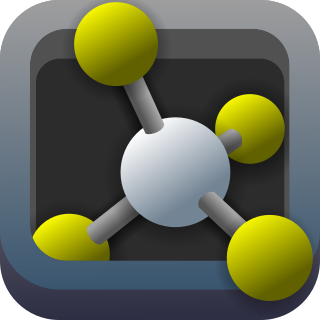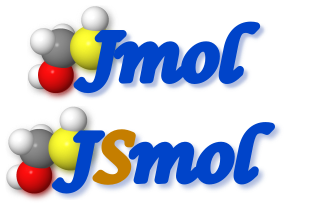Related Research Articles
Computational chemistry is a branch of chemistry that uses computer simulation to assist in solving chemical problems. It uses methods of theoretical chemistry, incorporated into computer programs, to calculate the structures and properties of molecules, groups of molecules, and solids. It is essential because, apart from relatively recent results concerning the hydrogen molecular ion, the quantum many-body problem cannot be solved analytically, much less in closed form. While computational results normally complement the information obtained by chemical experiments, it can in some cases predict hitherto unobserved chemical phenomena. It is widely used in the design of new drugs and materials.
Quantum chemistry, also called molecular quantum mechanics, is a branch of physical chemistry focused on the application of quantum mechanics to chemical systems, particularly towards the quantum-mechanical calculation of electronic contributions to physical and chemical properties of molecules, materials, and solutions at the atomic level. These calculations include systematically applied approximations intended to make calculations computationally feasible while still capturing as much information about important contributions to the computed wave functions as well as to observable properties such as structures, spectra, and thermodynamic properties. Quantum chemistry is also concerned with the computation of quantum effects on molecular dynamics and chemical kinetics.

The Sandia National Laboratories (SNL) is one of three National Nuclear Security Administration research and development laboratories in the United States, managed and operated by the National Technology and Engineering Solutions of Sandia. Their primary mission is to develop, engineer, and test the non-nuclear components of nuclear weapons and high technology. Headquartered on Kirtland Air Force Base in Albuquerque, New Mexico, it also has a campus in Livermore, California, next to Lawrence Livermore National Laboratory, and a test facility in Waimea, Kauai, Hawaii.
Incompatible Timesharing System (ITS) is a time-sharing operating system developed principally by the MIT Artificial Intelligence Laboratory, with help from Project MAC. The name is the jocular complement of the MIT Compatible Time-Sharing System (CTSS).

Graphviz is a package of open-source tools initiated by AT&T Labs Research for drawing graphs specified in DOT language scripts having the file name extension "gv". It also provides libraries for software applications to use the tools. Graphviz is free software licensed under the Eclipse Public License.

PyMOL is an open source but proprietary molecular visualization system created by Warren Lyford DeLano. It was commercialized initially by DeLano Scientific LLC, which was a private software company dedicated to creating useful tools that become universally accessible to scientific and educational communities. It is currently commercialized by Schrödinger, Inc. As the original software license was a permissive licence, they were able to remove it; new versions are no longer released under the Python license, but under a custom license, and some of the source code is no longer released. PyMOL can produce high-quality 3D images of small molecules and biological macromolecules, such as proteins. According to the original author, by 2009, almost a quarter of all published images of 3D protein structures in the scientific literature were made using PyMOL.
Jaguar is a computer software package used for ab initio quantum chemistry calculations for both gas and solution phases. It is commercial software marketed by the company Schrödinger. The program was originated in research groups of Richard Friesner and William Goddard and was initially called PS-GVB.

Jmol is computer software for molecular modelling chemical structures in 3-dimensions. Jmol returns a 3D representation of a molecule that may be used as a teaching tool, or for research e.g., in chemistry and biochemistry. It is written in the programming language Java, so it can run on the operating systems Windows, macOS, Linux, and Unix, if Java is installed. It is free and open-source software released under a GNU Lesser General Public License (LGPL) version 2.0. A standalone application and a software development kit (SDK) exist that can be integrated into other Java applications, such as Bioclipse and Taverna.
BIOVIA is a software company headquartered in the United States, with representation in Europe and Asia. It provides software for chemical, materials and bioscience research for the pharmaceutical, biotechnology, consumer packaged goods, aerospace, energy and chemical industries.
The following tables provide a comparison of numerical-analysis software.
Desmond is a software package developed at D. E. Shaw Research to perform high-speed molecular dynamics simulations of biological systems on conventional computer clusters. The code uses novel parallel algorithms and numerical methods to achieve high performance on platforms containing multiple processors, but may also be executed on a single computer.
Biochemical and Organic Simulation System (BOSS) is a general-purpose molecular modeling program that performs molecular mechanics calculations, Metropolis Monte Carlo statistical mechanics simulations, and semiempirical Austin Model 1 (AM1), PM3, and PDDG/PM3 quantum mechanics calculations. The molecular mechanics calculations cover energy minimizations, normal mode analysis and conformational searching with the Optimized Potentials for Liquid Simulations (OPLS) force fields. BOSS is developed by Prof. William L. Jorgensen at Yale University, and distributed commercially by Cemcomco, LLC and Schrödinger, Inc.
MacroModel is a computer program for molecular modelling of organic compounds and biopolymers. It features various chemistry force fields, plus energy minimizing algorithms, to predict geometry and relative conformational energies of molecules. MacroModel is maintained by Schrödinger, LLC.

WikiTrust is a software product, available as a Firefox Plugin, which aimed to assist editors in detecting vandalism and dubious edits, by highlighting the "untrustworthy" text with a yellow or orange background. As of September 2017, the server is offline, but the code is still available for download.

The Hillside Group is an educational nonprofit organization founded in August 1993 to help software developers analyze and document common development and design problems as software design patterns. The Hillside Group supports the patterns community through sponsorship of the Pattern Languages of Programs conferences.

Gene Designer is a computer software package for bioinformatics. It is used by molecular biologists from academia, government, and the pharmaceutical, chemical, agricultural, and biotechnology industries to design, clone, and validate genetic sequences. It is proprietary software, released as freeware needing registration.
Schrödinger, Inc. is an American life sciences and materials science company founded in 1990 that develops software for computational chemistry and has a pipeline of collaborative and internal drug discovery programs. The company is headquartered in New York, with regional headquarters in Munich, Tokyo and Bangalore.
Richard A. Friesner is an American theoretical chemist and William P. Schweitzer Professor of Chemistry at Columbia University. He was elected to the American Academy of Arts and Sciences in 2008, and the National Academy of Sciences in 2016. Richard Friesner co-founded Schrödinger in 1990.
rDock is an open-source molecular docking software that be used for docking small molecules against proteins and nucleic acids. It is primarily designed for high-throughput virtual screening and prediction of binding mode.
References
- ↑ "Prime". Schrödinger. Schrödinger, LLC. Retrieved 19 January 2017.
- ↑ "PLOP licensing".
- ↑ "Plop – Jacobson Lab Wiki" . Retrieved 7 November 2012.